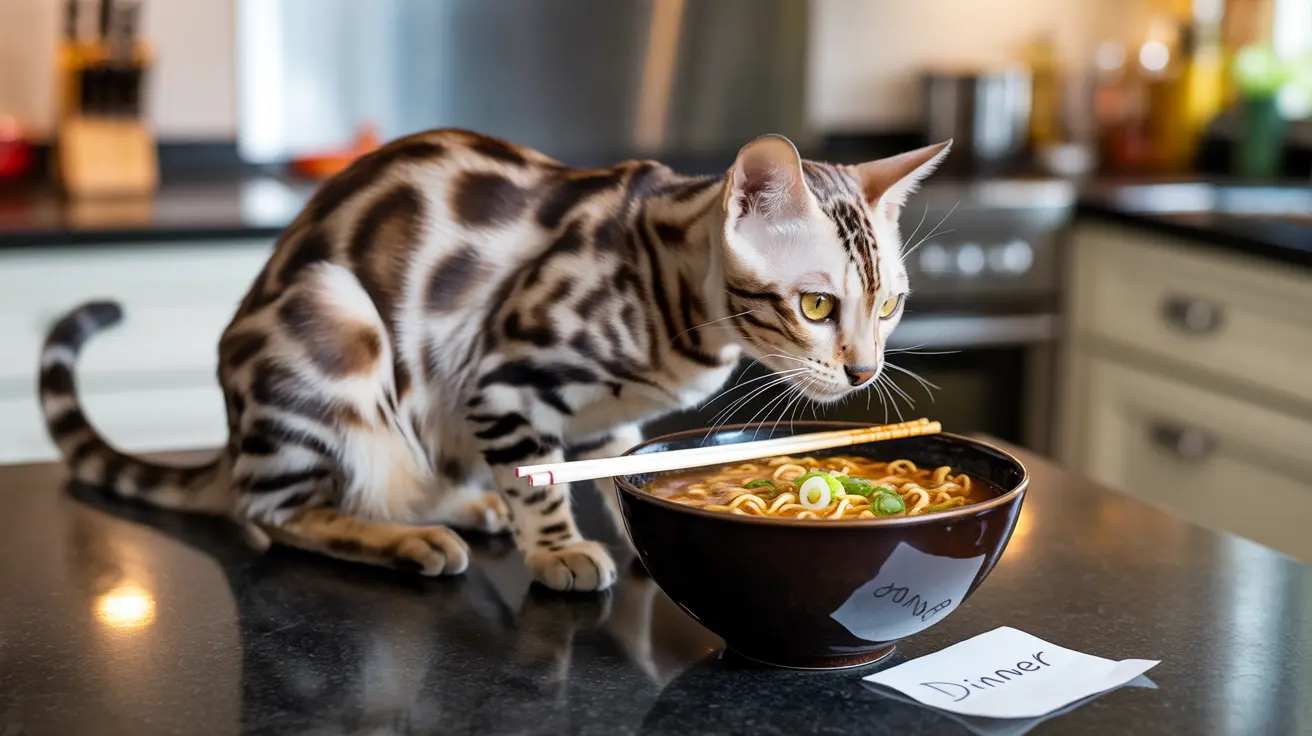Why Ramen is Dangerous for Cats
High Sodium Content
The most immediate danger of ramen for cats comes from its extremely high salt content. Cats are highly sensitive to sodium, and even small amounts can lead to serious health issues. A single serving of ramen can contain more sodium than a cat should consume in several days.
Toxic Seasonings and Additives
Ramen seasoning packets often contain ingredients that are toxic to cats, including:
- Garlic and onion powder
- MSG and artificial flavor enhancers
- Preservatives and food coloring
- Spices that can irritate their digestive system
Health Risks of Feeding Cats Ramen
Immediate Health Concerns
When cats consume ramen, they may experience:
- Severe dehydration
- Vomiting and diarrhea
- Lethargy and weakness
- Excessive thirst
- Tremors or seizures in severe cases
Long-term Health Impact
Regular exposure to ramen or similar human foods can lead to:
- Obesity and diabetes
- Kidney damage
- Heart disease
- Chronic digestive issues
- Nutritional deficiencies
What to Do If Your Cat Eats Ramen
If your cat has consumed ramen, follow these steps:
For Small Amounts
Monitor your cat closely for 24-48 hours, watching for signs of distress or unusual behavior. Ensure they have plenty of fresh water available.
For Large Amounts or Seasoned Ramen
Contact your veterinarian immediately, especially if you notice:
- Excessive thirst or urination
- Vomiting or diarrhea
- Unusual lethargy
- Loss of appetite
- Difficulty walking or unusual behavior
Healthy Alternatives to Ramen for Cats
Instead of sharing ramen, consider these vet-approved treats:
- Commercial cat treats formulated for feline health
- Small pieces of plain, cooked chicken
- Tiny bits of cooked fish (without seasonings)
- Cat grass or catnip for variety
Frequently Asked Questions
Can cats safely eat ramen noodles or plain cooked noodles?
No, cats cannot safely eat ramen noodles, even when plain. Cats are obligate carnivores and their digestive systems aren't designed to process carbohydrate-heavy foods like noodles.
What health risks does high salt content in ramen pose to cats?
High salt content in ramen can cause severe dehydration, kidney damage, sodium poisoning, and in extreme cases, can be fatal for cats. Even small amounts can be dangerous due to cats' sensitivity to sodium.
What should I do if my cat accidentally eats seasoned or spicy ramen noodles?
Contact your veterinarian immediately, especially if the ramen contained seasonings. Monitor your cat for symptoms like vomiting, excessive thirst, or unusual behavior, and seek immediate medical attention if these occur.
Why are carbohydrates and fats in ramen bad for a cat's diet?
Cats are obligate carnivores who need primarily protein-based diets. The high carbohydrate and fat content in ramen can lead to obesity, diabetes, and other health issues since cats' bodies aren't designed to process these nutrients effectively.
Are there any safe human food treats I can give my cat instead of ramen?
Yes, some safe human food treats include small pieces of plain cooked chicken, turkey, or fish (without seasonings or oils). Always consult with your veterinarian before introducing any new foods to your cat's diet.
Conclusion
While it might be tempting to share your ramen with your feline friend, it's crucial to remember that cats have specific dietary needs that differ significantly from humans. Keep your cat safe by sticking to veterinarian-approved foods and treats, and always store human food securely to prevent accidental ingestion.






